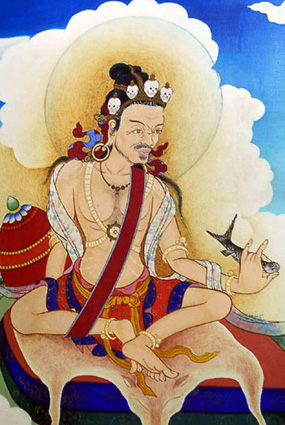 Matsuo Bashō (芭蕉) was a wandering Zen hermit of the Edo period, as well as an accomplished poet. Popularly considered the father of modern haiku, many of his verses are accepted as teaching in Zen circles today. The readily-memorised haiku format may drive some of this posterity, but there's no denying that Bashō's work often encodes palpable koanic insight.
Matsuo Bashō (芭蕉) was a wandering Zen hermit of the Edo period, as well as an accomplished poet. Popularly considered the father of modern haiku, many of his verses are accepted as teaching in Zen circles today. The readily-memorised haiku format may drive some of this posterity, but there's no denying that Bashō's work often encodes palpable koanic insight.Interestingly, his status as a self-trained free-range monk is rarely mentioned in our discussions of him, though we're happy to claim Bashō as the "Zen one" of Japan's Four Great Haikunists.
Thus do conservatives lay claim to the dissenters of yore.
Yet the eremitical nature of Bashō's practice is clearly evident in much of his work. Particularly his most famous poem, which is not merely lauded as Bashō's best, but in fact as the most awesomest haiku ever written, by anyone.
Feel up to it?
OK, clear your mind.
Ready?
the old pond
a frog jumps in
plop
That's it.
That's the poem.
Stuff to Notice
To begin with, this translation (Alan Watts, this time) is only one of dozens if not hundreds available; about which, more later. But I especially value Alan's take, emphasising as it does the humour that's central to Bashō's perspective.
Note also that while haiku – at least the classic kind – is supposed to contain references to nature, this one has nature coming out of its ears. I mean, there's no moonlight or cherry blossoms or summer rain or drifting snow. Nothing pretty, you dig. But nature? Yeah. It's got that in spades.
In his sardonic hermit way, Bashō seems to be saying, "I got yer nature, RIGHT HEAH!"
And then there's the Zen.
You may be thinking, "Big deal. Frog jumps in water. There's a noise. Nothing to see here."
And you may be right. I mean, you can get that kind of stuff anywhere, for cheap or free. Nothing unique is going on here. Nothing special.
Scared frog jumps in water, goes splash; not a headline you're likely to see in the Times.
Meanwhile, concentric circles are expanding in the water, lapping at the edges, returning through other circles approaching from behind. Frog resurfaces, climbs out. More circles. Wet frog drips, log gets wet, water runs off into pond.
The concentric circles expand and retract forever. The whole pond is implicated. And also its environs. And their environs. And all the environs beyond that.
And that's just one possible response. Maybe there's some suchness in there. Maybe some satori. Some admirers see all seven Zen principles of composition in these three banal lines.
Which is why they're sometimes called the most perfect haiku ever penned.
But not by its author, of course. We should also bear that in mind.
Language Matters
While we also remember language.
To start with, Bashō never wrote the poem reproduced above. And if by chance he had happened on it, none of that chicken scratch would have meant a thing to him. Because his text (per this source) was actually this:
古池や
蛙飛こむ
水の音
Which works out to:
furuike ya
kawazu tobikomu
mizu no oto
You don't need any Japanese to feel the visceral difference between this and literally anything it might have inspired in English. In fact, if you want to see just how thoroughly we anglophones can mess something up, check out the 32 translations catalogued here.
Robert Aitken's commentary on that page is also well worth the read, as is his stab at the source material:
The old pond has no walls;
a frog just jumps in;
do you say there is an echo?
And if you really want a plunge into the abyss, try Geoffrey Wilkinson, who starts with an acerbic comment on this whole frog thing, and then… well…
Go see for yourself. By the time Wilkinson's done he's taken you on a fascinating street tour of the haiku form and this one in particular, including several parodies by Japanese monks and poets over the past 500 years.
For example:
Old pond—
Bashō jumps in
the sound of water
– Zen master Sengai Gibon, 1750–1837.
Master Bashō,
at every plop
stops walking
– Anon, 18th century.
...while fellow hermit Ryōkan (1758–1831) had this to add:
The new pond—
not so much as the sound of
a frog jumping in
To say nothing of the fellow who wrote a limerick. (Yes, really.)
So if you're a fan of haiku, or hermits, or haiku-writing hermits, take a good surf into the lore of Bashō's frog. By the end of the evening you will have visited many corners of Zen, Japan, poetry, and history, and learned a great deal about the practice value of small bodies of water.
(Photo courtesy of Wikimedia Commons and a generous photographer.)








